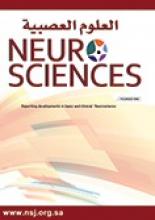Abstract
OBJECTIVE: Chewing fresh leaves of the Khat plant (Catha edulis), represents a widespread habit with a deep-rooted sociocultural tradition in Yemen. Khat is chewed for its central stimulant properties and to dispel feeling of fatigue and its use is believed to be associated with disturbance of mood. We studied the effect of chewing Khat leaves on human mood by using a standard questionnaire method, the Hospital Anxiety and Depression scale.
METHODS: A prospective study was conducted in the Faculty of Medicine and Health Sciences, University of Sana’a during the period January to June 2000. It comprised 200 healthy volunteers, interviewed on 2 occasions a week apart. Subjects either chewed Khat at least 3 hours daily for 3 days or abstained from chewing for at least 7 days prior to mood assessment using the Hospital Anxiety and Depression scale. Subjects were studied in random order.
RESULTS: Using the Hospital Anxiety and Depression scale, there was a significant increase (P<0.0001) of median score on the scale indicating mood disturbance during the Khat-arm of the study as compared to the control-arm. The effect was particularly evident shortly after the Khat session. Reactive depression symptoms were predominant.
CONCLUSION: Khat chewing did result in functional mood disorder. This effect is believed to be caused by the sympathomimetic action of cathinone on the central nervous system. The clinical implication of this study is that Khat-chewing might exacerbate symptoms in patients with pre-existing psychiatric disease.
- Copyright: © Neurosciences
Neurosciences is an Open Access journal and articles published are distributed under the terms of the Creative Commons Attribution-NonCommercial License (CC BY-NC). Readers may copy, distribute, and display the work for non-commercial purposes with the proper citation of the original work.






